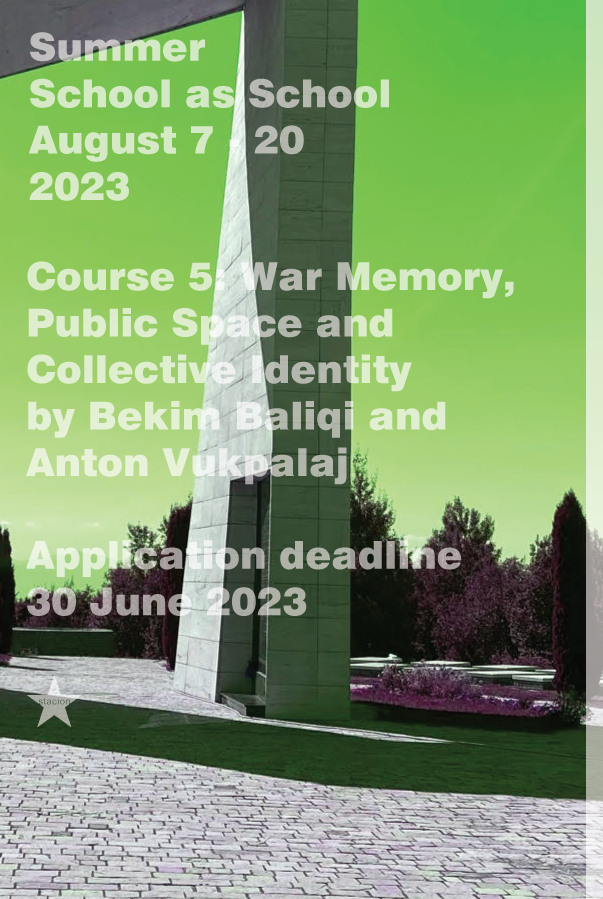
Course 5: War memory, public space and collective identity
By Bekim Baliqi and Anton Vukpalaj
7 - 19 August 2023
Course Level
5 ECTS
Description
In the process of identity-building, key political actors and groups are involved in reconstructing the past. They all seek to articulate collective memory in a way that could be useful to legitimize power and for the identity formation. In this political process, Ashplant, Dawson and Roper (2000: 16-32) distinguish three key aspects of the struggle to articulate war memories: its narratives, arenas and agencies.
Whereas narratives of articulation refer to common formulation and discourses, arenas represent social-political spaces within actors contain and promote claim for the recognition of their war memories. As the last dimension, agencies of articulation refer to those institutions, organizations or movements through which social actors seek and preserve recognition for their war memories. Thus, a memory of past events for every group has different connotations and thus will be differently manifested.
The course will outline the key concepts and undertake a literature review concerning the politics of identity and issue of collective memory, based in several case studies. The past and the way it is remembered, interpreted and manifested plays a crucial role in the formation of collective identities.
Collective memory, be it through narratives, oral histories, myths and public spaces, refers to common perceptions of the past, where societies aim to ensure continuity by linking the past, present and the future. Just as memory helps to shape individual belonging, collective memory serves to build and preserve a common identity. Hence, both types of memory are relational, and, in fact, individual memory is possible only in a social framework.
The renowned memory study scholar Aleida Assman goes even further in distinguishing four levels of memory: individual, social, political, and cultural. While individual and social memories are grounded in lived experience, political and cultural memories, on the other hand, are founded on symbolic and material representations as well as education and collective participation (Assmann, 2006: 215).
In a second part, the course will focus on the mechanisms of transitional justice and its relationship to memory in societies that have gone through post-authoritarian and post-conflict transitions (Kosovo and the Balkans have gone through both). Judicial and non-judicial mechanisms of transitional justice aim to bring to light the truth of the past and the ultimate goal of all these mechanisms is inter-individual and inter-society reconciliation. Through the study of these mechanisms, we will see to what extent memory can be politicized, thus preventing the achievement of transitional justice objectives and confronting the past. An analysis of the relationship between memory and transitional justice provides a better understanding of the achievement of the essential objectives of transitional justice, namely peace and reconciliation.
Biographies
Bekim Baliqi has studied Political Science (Mag.Phil.) and has completed Doctoral studies (Dr.phil) at the Institute of Political Science, University of Vienna. He is an ordinary Professor at the Department of Political Science, University of Prishtina, with main research interests in nationalism studies, memory politics and democratization in post-conflict societies. He has participated in a number of scientific international symposiums and research projects and has published several books and research articles in renowned journals. He is fluent in English, German, Serbian and understands Turkish and Italian.
Anton Vukpalaj, PhD, is a Political Scientist and Assistant Professor of Political Science at the University of Prishtina, Kosovo. His main focus of research lies on statebuilding and transitional justice in Kosovo and Southeastern Europe. From 2018, he is an inviting Professor at the Faculty of Arts and Humanities at the University of Fribourg, Switzerland. He is the author of numerous works, including Ex-Yougoslavie, de la guerre à la justice, Michel Houdiard Éditeur, 2010. His most recent publication (book) is Forging Kosovo: Between Dependence, Independence and Interdependence, Peter Lang, Bern, 2021, 324 pages (co-editor with Arben Hajrullahu).
Participation
15 participants will be selected to participate in this course. Eligible participants must read the Terms, fill out the application form, upload the required documents and submit the application form. Incomplete applications will not be considered.
The conditions and registration fees
Enrollment fee 1 - 470 euros for self-paying students, with the offer of accommodation in student residences.
Enrollment fee 2 - 670 euros for institutionally sponsored students, with the offer of accommodation in student residences.
Special conditions apply for alumni of the Summer School as School.
Scholarships are available for students from Kosovo.
Payment must be made after successful application.
Late applications may be accepted until July 22, 2023.